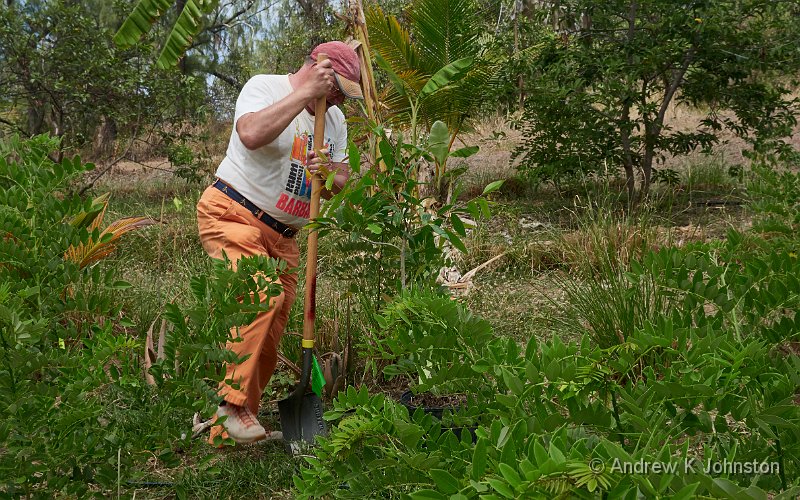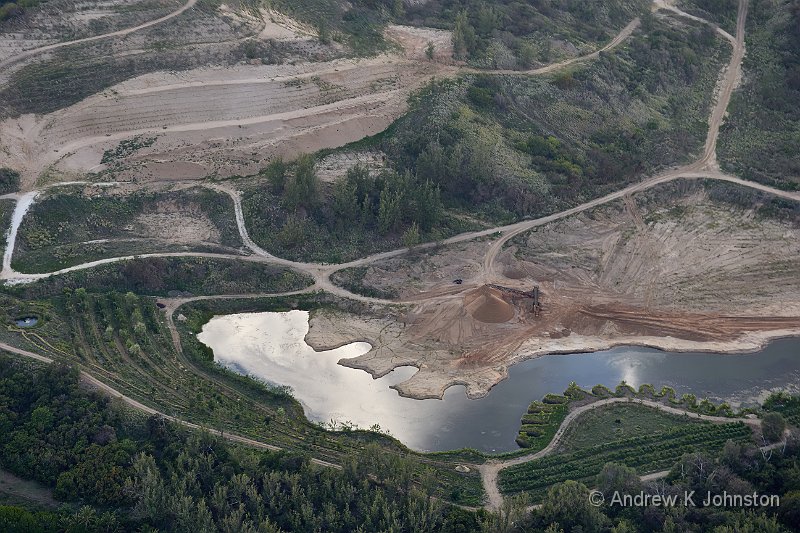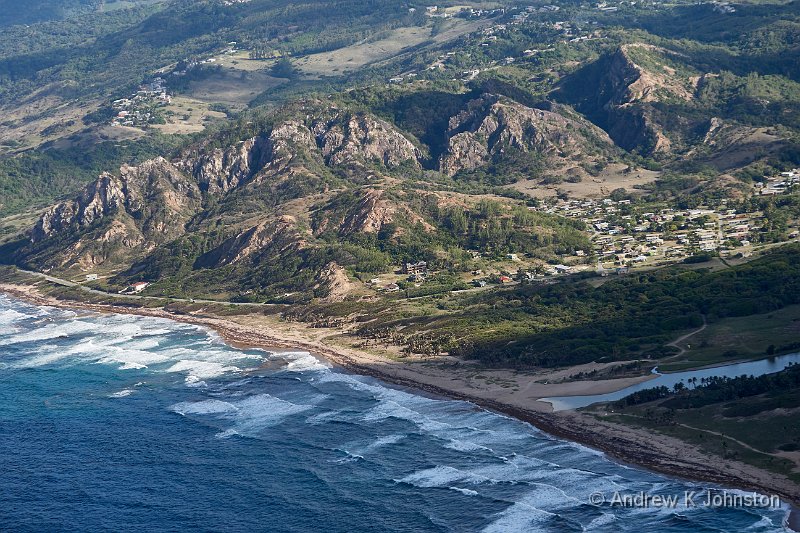
| Andrew planting a tree at Walkers Reserve | |
| Camera: Panasonic DC-G9 | Date: 21-04-2022 13:58 | Resolution: 4851 x 3032 | ISO: 200 | Exp. bias: -66/100 EV | Exp. Time: 1/200s | Aperture: 8.0 | Focal Length: 20.0mm | Lens: LUMIX G VARIO 12-35/F2.8 | |
With timing more serendipitous than deliberate I spent the eve of Earth Day at one of Barbados’ newest features – the nature reserve being created as the old sand quarry at Walkers in St. Andrews is being wound down. This was fortuitous in more ways than one: I’m always keen to see new attractions when we visit Barbados, but I can now claim something of a professional interest as well. My latest engagement with Aviva centres on their ambition to become the leading financial services organisation in respect of sustainability, and it was good to go hands on with a small but very practical sustainability project.
The site is in a corner of Barbados which doesn’t support much agriculture, and has since 2016 been designated as a National Park (along with most of Barbados’ East and North Coasts). When I’ve previously looked down on the area from the surrounding hills, or during a wonderful microlight flight in 2019, it’s always seemed somewhat ugly and barren, so the idea of turning it back into a semi-wild reserve seems perfect.

| The Walkers Reserve site in 2019, early terracing work visible (Show Details) |
There are some challenges. Although Barbados is green everywhere you look, and I’m writing this in the middle of a truly Biblical downpour, the reserve has to be designed on a "water deprived" basis, as it has to cope with both protracted dry periods, and then heavy rains most of which, unless trapped, will just drain straight to the sea. That affects both the choice of plants, which have to be tolerant to salt, heavy rainfall and dry periods, and the landscaping, designed with multiple traps to catch and slow rainwater for irrigation.
Much of Barbados’ agriculture is mono-cultural, especially the large areas dedicated to sugar cane, with all the associated physical and economic risks. Planting at the reserve is by contrast a deliberate polyculture, with multiple different species deliberately alternated. It’s a good example of taking some short-term pain (e.g. more tricky harvesting of the fruit) for longer-term benefits.
They also have to manage the endemic vegetation and wildlife, which includes a number of invasive species, most noticeably the weed which fills the freshwater ponds. Barbados doesn’t have a great record on invasive species management. One of the creatures which crossed our path on the tour was a mongoose – now a significant part of the Barbados fauna, but originally introduced to try and keep down the (also introduced) rat population. The problem is that rats are nocturnal and mongeese are diurnal, so never the twain meet…
Education is a major part of the reserve’s mission. Some of the biggest challenges relate to the behaviour of local people and visitors, and will only be addressed by cultural change driven by that education. Littering has long been an issue across Barbados, and during heavy rains the reserve gets a graphic measure of this as anything deposited in the local waterways is washed down through its rivers and ponds. Plastic bottles are a constant nightmare, but my guide Meike has even seen a dumped fridge. Educational and information campaigns are starting to have an effect, but without a recycling culture (and with few local recycling facilities) it’s going to be a slow process.
Other behavioural challenges include persuading local farmers to use fewer chemicals, and persuading the owners of ATVs and dirt bikes not to use them on the fragile, protected dunes on the coastal side of the reserve.
One of the most graphic examples of where behavioural change could help is the "harvesting" of coconuts. Wherever there’s a coconut palm tree there will be coconuts, which will just rot if they fall on the ground, and there will usually be someone who wants to harvest them. They are definitely a renewable natural resource. So far so good. However what tends to happen with the vast majority on Barbados is the coconut is tapped for the coconut water, and then the rest of the nut, including the flesh/cream and copra, is just left to rot almost where it fell. There’s no attempt to extract and use what must potentially be a valuable food resource (surely at least for animal feed?) On top of that many of the illicit "harvesters" use spiked shoes to climb the trees, with a devastating effect on the tree bark. One can’t help but think that there has to be a better, longer-term approach.
As part of your visit you can plant a tree, which is a great opportunity to both make a practical contribution and offset the carbon emissions of your flight. I was given a Jamun tree to plant. These are fast-growing trees which produce both edible fruit and eventually useful water-resistant timber. As they can grow to over 10m tall one tree should comfortably offset the 2 tonnes or so of CO2 generated for a return Economy flight across the Atlantic, but it puts it in perspective that for true offsetting every passenger should plant such a tree on every trip, and that’s certainly not happening.
Even one tree helps the staff with their current project. Apparently the Jamun fruit make excellent wine, and the bee colony is now producing enough honey that they’ve started on making mead. That’s one Barbados tradition which doesn’t need to change, growing stuff and turning it into booze!

| Walkers and Windy Hill from a Microlite (Show Details) |
As with any post-industrial change there are both positive and negative impacts. Barbados will no longer be self-sufficient in sand for construction, and those who quarried and transported it will have to find alternative work, replaced by biologist/farmers, who also have to do a turn as tour guides and educators. It will be interesting to watch how things progress, but I hope that Walkers Reserve will succeed as a considered greening of an old industrial scar. It’s well worth a visit, and I hope its educational mission succeeds in building longer-term, more environmentally-focused thinking on Barbados and elsewhere.
 Thoughts on the World (Main Feed)
Thoughts on the World (Main Feed) Main feed (direct XML)
Main feed (direct XML)